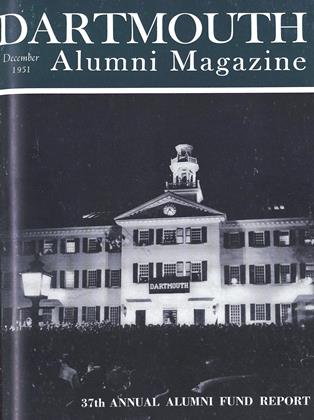ONE of the unhappiest aspects of "growing old" is the rapidity with which the circle of one's intimate friendships narrows. It is in sorrow of this kind that I find myself concerning Leon Richardson's death. College mate during my undergraduate days, and in the half century since continually in the service of the College he loved, acquaintanceship developed into friendship, and friendship ripened into deep affection. Dartmouth owes him more than can ever be expressed and the sons of Dartmouth are obligated to him for values he unceasingly contributed to the College as faculty member, as alumnus and, not to be ignored, as one of the little group of co-workers in the class of 1900 which has through the years made that class one of the top-bracket classes in service to Dartmouth's interests.
Not only in knowledge of his subject but in the breadth of his scholarly interests he was an invaluable member of the faculty. Upon his graduation he was offered appointment as instructor in three different departments, history, English, and chemistry, the last of which he accepted. His "History of Dartmouth College," an interesting presentation in meticulous accuracy of detail and in its brevity as compared with the scope of the subject, is a model and has long been recognized as such by officers of sister colleges.
Aside from his value as a teacher, his contribution to the faculty in memberships on, and chairmanships of vitally important committees over the years has been beyond description in anything but an extended biography.
He was no man to give indorsement or quick approval to a cause without full consideration of it and coming to his own conclusions. He would perhaps have been a better teacher if his impatience at purposelessness and ineptitude had not been so great and if his appreciation had been a little keener for possibilities of the slow mind. But for the interested, eager and intelligent student, his admiration was unbounded and he viewed them with an affection that probably few of them ever realized. It was a cardinal sin in his book ever to show any of the wealth of friendly emotion which possessed him. But little of this was existent for one whose standards did not rise above indifference or mediocrity.
I but speak the sentiments I am certain are held by those who knew him best. Some of the most savory of the spices of life are gone for those who were his intimates. If one wanted "yesyessing" in an associate or if one wanted unconsidered approval as a friend he was no man to seek. But if one wanted ungrudging cooperation in work for the best interests of a cause, such as Dartmouth College, or if one wanted friendship based on critical appraisal of one's qualities and acceptance of those he found good, no associate could be more desired and no friendship could be more worthwhile. Dartmouth has lost a devotedly loyal son and some number of us have lost a friendship that is irreplaceable.
 View Full Issue
View Full Issue
More From This Issue
-
 Class Notes
Class Notes1917
December 1951 By KARL W. KOENIGER, DONALD BROOKS -
 Article
ArticleThe 1951 Alumni Fund
December 1951 By CHARLES J. ZIMMERMAN '23 -
 Class Notes
Class Notes1929
December 1951 By F. WILLIAM ANDRES, EDWIN C. CHINLUND, JACK D. GUNTHER -
 Class Notes
Class Notes1950
December 1951 By ENS. SCOTT C. OLIN, SIMON J. MORAND III -
 Class Notes
Class Notes1935
December 1951 By HENRY R. BANKART JR., JOHN WALLACE, SIDNEY A. DIAMOND -
 Class Notes
Class Notes1946
December 1951 By REGINALD F. PIERCE JR., ROBERT Y. KIMBALL
Article
-
 Article
ArticleANNUAL GIFT OF $5,000 BY THE CLASS OF '79
November, 1025 -
 Article
ArticleClub President of the Year
NOVEMBER 1966 -
 Article
ArticleSomeone wrote them, but did anyone read them?
MARCH 1982 -
 Article
ArticleThe People Behind The Lower Forty Characters
SEPTEMBER 1990 -
 Article
ArticleLacrosse
June 1956 By CLIFF JORDAN '45 -
 Article
ArticleThe Independent
April 1995 By Denise W. Goodman; Tsongas and Rudman comments obtained by Timothy J. Burger

